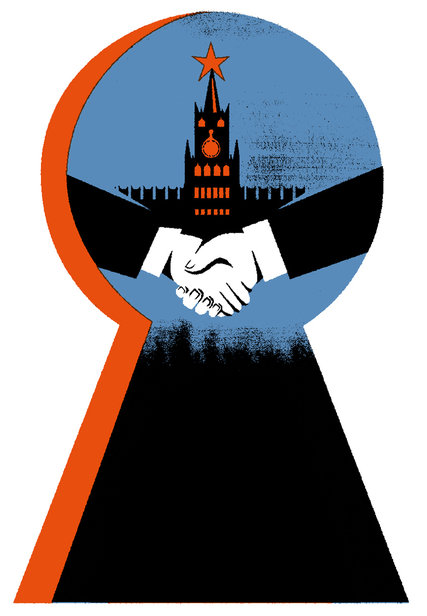THE TRUMP-RUSSIA NEXUS
The Trump-Russia Nexus
The acting director of the F.B.I., Andrew McCabe, told Congress on Thursday that President Trump’s firing of James Comey has not derailed the agency’s investigation into possible collusion between Russia and the Trump campaign. Which is good news. Despite Mr. Trump’s assertion that the idea of collusion is “a total hoax,” and despite many unknowns, the links continue to pile up. Here is a partial accounting of the connections we do know something about.
THE TRUMP FAMILY BUSINESS There may be no Trump Tower in Moscow or St. Petersburg, but it is not for lack of trying. Mr. Trump and his family have sought to do business in Russia since at least the 1980s. They have also developed extensive commercial and personal relationships with politically connected Russian businessmen. In 2008, Donald Trump Jr. told a real estate conference, “Russians make up a pretty disproportionate cross section of a lot of our assets; say in Dubai, and certainly with our project in SoHo and anywhere in New York,” according to eTurboNews, a travel industry news site. The author James Dodson said that another son, Eric Trump, told him in 2013 that Russians have bankrolled Trump golf courses: “Well, we don’t rely on American banks. We have all the funding we need out of Russia.” Eric Trump denies saying that.
In addition, Donald Trump worked with the Agalarov family, a prominent Russian business group, to host the 2013 edition of his Miss Universe pageant in Moscow. Mr. Trump met more than a dozen of the country’s most prominent oligarchs while he was there, Bloomberg News reported. Jared Kushner, who is married to Ivanka Trump and is a senior adviser to the president, has also been caught up in the Russia story. During the transition, Mr. Kushner met with the Russian ambassador, Sergey Kislyak, as well as with the top executive of a Russian government-owned bank.
The world would know much more about Mr. Trump’s foreign partnerships if he had released his tax returns, as every president has done for the last 40 years.
MICHAEL FLYNN Mr. Flynn, the former national security adviser, had several conversations with Mr. Kislyak during the transition in which they discussed American sanctions against Russia. Mr. Trump fired Mr. Flynn after public disclosure that he had lied to Vice President Mike Pence about the nature of those talks. In addition, RT, a Russian government-backed news outlet, paid Mr. Flynn $45,000 for giving a speech in December 2015 in Moscow. On the same trip, he sat next to President Vladimir Putin at an RT gala. The Pentagon is investigating whether Mr. Flynn, a retired military intelligence officer, failed to disclose and obtain approval from the State and Defense Departments before taking money from a foreign government.
JEFF SESSIONS Mr. Sessions, the attorney general, said during his Senate confirmation hearing that he did not have any contacts with Russian officials while he was actively campaigning for Mr. Trump. In fact, he met with Mr. Kislyak twice, once in his Senate office and once at the Republican National Convention.
PAUL MANAFORT Mr. Manafort, a former chairman of the Trump campaign, worked as a consultant for a pro-Russia political party in Ukraine and for Ukraine’s former president, Viktor Yanukovych, who was backed by the Kremlin. Mr. Manafort has been accused of receiving secret payments from the pro-Russia party. About a decade earlier, Mr. Manafort also worked for Oleg Deripaska, a Russian oligarch with close ties to Mr. Putin. The Associated Press obtained a memo he wrote to Mr. Deripaska offering a plan that he said would “greatly benefit the Putin Government.”
CARTER PAGE American officials believe that Mr. Page, a foreign policy adviser, had contacts with Russian intelligence officials during the campaign. He also gave a pro-Russia speech in Moscow in July 2016. Mr. Page was once employed by Merrill Lynch’s Moscow office, where he worked with Gazprom, a government-owned energy giant.
ROGER STONE Mr. Stone, an informal but close Trump adviser, exchanged messages last summer with Guccifer 2.0, a Twitter account widely believed to be a front for Russian intelligence operatives who were involved in the hacking of the Democratic National Committee and Hillary Clinton’s campaign. During the campaign, Mr. Stone seemed to know in advance that WikiLeaks would release emails from the account of John Podesta, Mrs. Clinton’s campaign chairman.
Mr. Trump and his associates can cry themselves hoarse that there is neither smoke nor fire here. But all in all, the known facts suggest an unusually extensive network of relationships with a major foreign power. Anyone who cares about the credibility of the American electoral process should want a thorough investigation of whether and how Russia interfered in the election and through whom.








Follow Us!